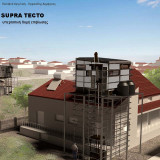The flood disaster that occurred in the areas of Karditsa and Palamas in the Thessalian Plain in September 2023 highlighted the need for sustainable solutions to address future risks. Climate change threatens the balance between the natural and built environment, raising concerns about the safety and productivity of the region. Such events impact residents, “demolish” material goods, traditions, dreams, and connections to a place, often leading to residential and spatial deadlocks.
The spatial planning of human settlements must be re-evaluated to implement new, flexible, and holistic strategies. This includes relocating each household to a safer point within its own home. In this way, alternative social and economic models can be created, involving partial relocation without alienation. The idea of ‘supra tecto’ aims not to perpetuate a temporary condition but to integrate local practices, architectural and non-architectural approaches, traditions, and the needs of daily life into modern reality. The settlement of Palamas in the Karditsa region is used as a case study for applying similar solutions to the conditions of extreme climate change.
The question remains: how can an "urgent" structure transform the situation quickly, effectively, and as painlessly and discreetly as possible for the individual? A proposed solution involves constructing a structure above the roof of each house. It is made of lightweight materials and can be easily assembled like a kit. This emergency structure is supported by scaffolding and has the capability to float in the event of a major flood.
